Complete Guide To German Shepherds: Care, Grooming, Exercise, and More
The German Shepherd is a large and beautiful dog that is intelligent and fiercely loyal. Widely used for various applications ranging from a scent dog with law enforcement to a service dog to help the blind, the German Shepherd is eager to work and please his owner.
Compared to other dogs, the German Shepherd may not be the most affectionate but will quickly form a deep and devoted attachment to you and your family, willing to protect you at all costs. With a combination of brains, beauty, and physical aptitude, it is no wonder the German Shepherd is one of the most popular dogs in the United States.
The German Shepherd is one of the most common purebred dogs I see in my veterinary practice. I’ve been around them for the past 30 years. The following is based on that experience as well as my conversations with many owners of German Shepherds.

Table of Contents
How Big Do German Shepherds Get?
This breed of dog is a large dog with males slightly larger than most females. Expect male German Shepherds to weigh about 75 to 95 pounds and stand between 24 and 26 inches at the shoulder. Female German Shepherds will weigh slightly less and will usually stand about 22 to 24 inches at the shoulder.
What Are The Coats Of German Shepherds Like?
Bred to live in harsh climates and spend most of their lives outdoors, this dog has a thick double coat that is medium-length. The coat helps keep the dog warm through all weather conditions and helps keep the dog protected from snow and rain. The coat is also able to repel burrs and thorns that could stick in the thick fur.
While it may be common to find the black and tan variety of German Shepherd, the American Kennel Club recognizes various colors. Available color patterns include solid black, black and cream, black and tan, black and gold, and sable. While white German Shepherds exist, the AKC does not formally recognize this color pattern.
How Long Do German Shepherds Generally Live?
For a large breed dog, the German Shepherd is a reasonably long-lived dog. Most dogs live between 9 and 13 years, with an average lifespan of about 11 years. The oldest German Shepherd on record lived to be an astounding 18 years of age.
What Health Conditions Do German Shepherds Have?
Unfortunately due to both the popularity of the breed as well as many breeders not being particular scrupulous in their choice of breeding pairs, this breed has quite a few common health conditions. In my experience, the most common include:
- Hip Dysplasia
- Bloat/GDV
- Cancer (Osteosarcoma, Spleen/Liver Cancer)
- Degenerative Myelopathy
- Perianal Fistulas
- Allergies/Atopic Dermatitis
- Pannus
What Is The Personality of a German Shepherd?
The German Shepherd is an intelligent and active dog. This dog is skillful and enjoys having a job to do. Whether it is sitting outside watching the herd or helping law enforcement sniff out potentially dangerous substances, the German Shepherd likes to please his owner. This dog can be used for a variety of applications and will learn new behaviors very quickly.

When it comes to their courage, this dog is unmatched in the canine world. One of the trademark attributes of this breed of dog is the unwavering loyalty and courage exhibited every day. The German Shepherd will show extreme confidence and devotion as it works to defend the people and animals he loves.
While this dog may not snuggle with family members and sit on your lap, it can grow to be a loving dog. The German Shepherd can have an innate tendency to be suspicious, especially of strangers, making him an ideal watchdog. However, with the right socialization, especially as a puppy, the German Shepherd can learn to accept and love people outside of his immediate family.
What Are The Grooming Needs of German Shepherds?
If you like keeping your home tidy and fur-free, you should probably look for a different dog. This breed of dog will shed and shed heavily with the medium-length fur and the thick double coat. Aside from regular shedding, this dog will go through a heavy shed period, known as “blowing his coat,” twice a year. This occasion usually coincides with changing seasons and will last for several days.
To keep shedding minimal, brush your German Shepherd at least once per week. This grooming will help pull out the dead fur and keep your dog’s fur clean of dirt and danger. Plus, removing dead hair from the soft underlayer of fur will reduce the amount of shedding.
This breed of dog only needs a bath once every few months. It is a good idea only to bathe this dog when necessary. The German Shepherd relies on essential oils in the skin and fur to keep his fur in great condition. An occasional trip to the groomer can help remove dirt and debris but should not be a regular occurrence.
Be sure to keep the dog’s nails trimmed short. If your dog has the chance to walk on a rough surface, the nails may naturally become short with regular wear. This breed of dog loves to chew, so be sure to have plenty of safe chew toys and dental chews to keep your pet’s teeth clean and healthy. While most of the plaque and tartar on your dog’s teeth can be removed with regular chewing, you may need to brush your dog’s teeth periodically to keep the teeth in good shape.
What Are The Exercise Needs Of A German Shepherd?
The German Shepherd is an extremely athletic and active breed. Not only does he need to be physically exercised, but you must keep his brain active as well. This dog requires regular mental and physical stimulation. When a German Shepherd, especially a young German Shepherd, is left with unused energy, he can quickly become destructive or develop nuisance behaviors such as digging, chewing, and barking.

This dog needs at least one long and vigorous walk each day. The German Shepherd has endless energy, so taking your dog on a jog or playing a lively game of frisbee will help to release some pent-up energy. The German Shepherd can run for miles and will enjoy running alongside your bike. Try to mix up the physical activity daily to prevent your German Shepherd from becoming bored with the same exercises day in and day out.
Because this dog is brilliant and learns new behaviors quickly, the German Shepherd excels at obedience and agility competitions. This athletic dog will quickly learn herding, agility, dock diving, tracking, and obedience. Enroll your dog in these activities and watch your German Shepherd blossom into an even more confident and capable dog.
What Is The Best Food For A German Shepherd?
For German Shepherd puppies, you will need to make sure you don’t feed them too much too fast. It’s easy because they are usually chow hounds, but you want to control their growth. Growing too fast can cause some early bone and joint problems that are easily avoided.
Best Puppy Food For German Shepherds
Best Adult Food For German Shepherds:
- Purina Pro Plan Large Breed
- Eukanuba Adult Dry Dog Food
- Nutro Natural Choice Large Breed Adult
- Merrick Classic Healthy Grains Dry Dog Food
Please don’t listen to the folks at the pet store trying to convince you to buy a grain-free diet for your dog. There’s zero science behind that and vets are actually seeing diseases now related to feeding grain-free foods.
Where Can I Find a German Shepherd?
With how widely popular the German Shepherd is, this dog is regularly available from breeders. Before choosing a breeder, make sure that you have a chance to learn about the breeder’s practices. At a minimum, your new puppy should be screened for elbow and hip dysplasia.
It is widely accepted that there are two distinct types of German Shepherds. The American German Shepherds tend to be bred for their looks and ability in the show ring. These breeders put a preference on the appearance and size of the dog. Comparatively, the German variety of German Shepherd tends to breed their dogs for their ability. Consider how you will want to work with your dog and ensure you find a breeder with the appropriate attributes in their litters.
In my experience, the German lines are healthier. That’s my opinion and I’m sure folks will argue with me. However, I can’t just not tell you that. You can find healthy and confident dogs from American lines, but you have to really do your homework to find a reputable breeder. The days of bringing home an excellent German Shepherd puppy from just anyone are long gone.
If possible, try to meet the parents of the German Shepherd puppy. Hopefully the breeder has done some temperament testing so they can match you with the right dog. Make sure you find a social yet confident puppy to take home.
Search for a local breed club and ask their opinions on local breeders. That can sometimes be a great way to find out who really is reputable and who is not.
Of course, there is always the option to adopt a German Shepherd from a rescue. There are several reputable rescues dedicated to this special breed of dog. By adopting a German Shepherd from a rescue, such as the American German Shepherd Rescue Association, Inc., you can not only get a purebred dog you want but help a dog in need. Many available German Shepherd rescues will have puppies, as well as adults available for adoption.
Where Can I Find Out More About German Shepherds?
German Shepherd Dog Club Of America
The Complete Guide to German Shepherds
Interesting Facts About German Shepherds
- The German Shepherd is active, intelligent, and loyal, which helps it land its rightful place as one of the top 10 most popular dogs in the United States. This dog is also extremely recognizable, appearing as a working dog in several applications. The German Shepherd can easily be recognized as a working dog with law enforcement, as well as a search and rescue dog, herding dog, therapy dog, or simply a loving family pet.
- This breed of dog sprung to popularity following World War I. An American soldier, Corporal Lee Duncan, rescued a German Shepherd puppy from a kennel in France. The soldier brought the dog back to California, where he was trained and worked as one of the most famous dogs in Hollywood. This dog adopted the name Rin Tin Tin and is mainly responsible for popularizing the breed.
- While this dog is not overly affectionate, it can make a great family dog if you have older children. Always supervise a dog this large around young children and toddlers. Although the dog may just want to play, the exuberant nature of a young German Shepherd could easily knock over and hurt a small child. If raised together, the German Shepherd will look after children with the same devotion and dedication as the rest of his family.
- If you do not have time to dedicate to this breed of dog, offering lengthy play sessions, continuous mental stimulation, and loads of physical exercise, consider another breed of dog. The German Shepherd must stay mentally and physically active; otherwise, it may become anxious, destructive, and bored.
